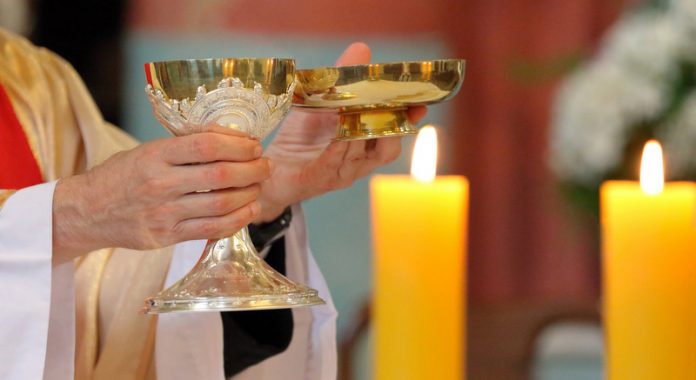
MARY McENTEE McGILL
My thesaurus notes that the word initiate means “primary, basic, first… germinal.” These terms perfectly describe the Sacraments of Initiation. These three Sacraments truly are primary and basic to our faith. They are germinal. They are the seeds planted deep inside us that will grow into the living fruit of our Catholic belief.
In this Gathering Prayer, let us focus on these three Sacraments and on how they have formed our faith.
Reading: Matthew 28:20
Leader: Let us begin with a quote from the Catechism of the Catholic Church: “The Sacraments of Christian Initiation—Baptism, Confirmation, and the Eucharist—lay the foundations of every Christian life…By means of these Sacraments of Christian Initiation, [we] thus receive in increasing measure the treasures of the divine life and advance toward the perfection of charity” (n. 1212, emphasis in original).
The first Sacrament of Christian Initiation is Baptism. The word comes from the Greek baptizein which means “plunge” or “immerse.” Being plunged into water symbolizes the person’s burial into Christ’s death and rising like Christ into a new creation.
Recall the Baptism of your children, or any Baptism that you may have celebrated with family or friends. Were there signs of dying to new life? Was there true joy from the community? From the person baptized? (Allow time for reflection and sharing.)
The second Sacrament of Christian Initiation is Confirmation. The Catechism says that “Confirmation perfects Baptismal grace; it is the Sacrament which gives the Holy Spirit in order to root us more deeply in the divine filiation, incorporate us more firmly into Christ, strengthen our bond with the Church, associate us more closely with her mission, and help us bear witness to the Christian faith in words accompanied by deeds” (n. 1316).
Can you remember your Confirmation? Who was your sponsor? What saint’s name did you choose and why? How does the confirmation of our teens differ from the confirmation of our catechumens? Why is that so? (Allow time for reflection and sharing.)
The Catechism states that “The Holy Eucharist completes Christian initiation” (n. 1322) and “The Eucharist is ‘the source and summit of the Christian life’” (n. 1324). The early church community celebrated the Mass around a dinner table. Stories were told and prayer was shared. Within the meal, bread was blessed and broken. Wine was shared and all recognized this as food given by Jesus Christ—food to fill them with the strength and love of faith. The Greek word eucharistein expresses thanksgiving—a giving of thanks to God who has given us this wondrous gift.
We are true members of the Church and disciples of Jesus Christ. Recall your First Communion. Can you remember a time when the Eucharist was especially meaningful to you? Can you share this with our community? (Allow time for reflection and sharing.)
Now let us hold hands and thank God for the gift of the Sacraments of Christian Initiation. Let us ask God to guide us as we prepare others to receive and celebrate these beautiful gifts.
Prayer: God, through these Sacraments of Christian Initiation, you have filled us with the desire to become faithful Christians. As we continue to grow in wisdom and knowledge, we ask that you remain with us, that you respond to our hopes, that you answer our prayers. We ask this through your Son, Christ our Lord.
All: Amen.
Mary McEntee McGill is the Pastoral Associate for Religious Education and Liturgical Education for Holy Trinity Parish in Dallas, TX. She is the author of Stories to Invite Faith Sharing (Resource Publications).
This article was originally published in Catechist magazine, December 2009.
Image Credit: Wideonet, istock




